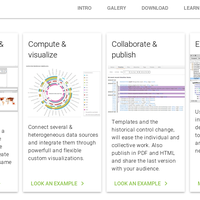Pocket infrastructures to bridge reproducible research, live coding, civic hacktivism and data feminism for/from the Global South
- Track: Open Research Tools and Technologies devroom
- Room: AW1.126
- Day: Saturday
- Start: 15:30
- End: 16:00

We will showcase Grafoscopio, a flexible, extensible, self contained "pocket infrastructure", which simplifies infrastructure to amplify participation, so reproducible research and publishing, agile data storytelling and custom data visualization can be used in fields like investigative journalism, data feminism and civic hacktivism. We will show prototypes developed with Grafoscopio in the previously mentioned domains, the motivations behind Grafoscopio and the local community practices around it that deconstruct binary relations of power (software developer/user, data producer / consumer, software binary / source code, male/female) and approach reproducible research practices and tools from a perspective located and embodied in a particular place of the Global South in Latin America and in contrast/dialogue with Global North perspectives.
Reproducible research (and publishing) has been confined mostly to academic places. But it has a lot of potential in several other places like investigative journalism, data feminism and civic hacktivism, as we have showcased by building several prototypes, including: making the so called "Panama Papers" data leak story reproducible; creating domain specific visualizations for medicine information released by 16 governments; porting the Spanish Data Journalism Handbook and the Data Feminism book to our "pocket infrastructures" and the creation of agile and resilient tools and practices to write and publish together (see proposal links for a detailed view of such prototypes).
To bridge reproducible research and publishing, agile data storytelling and custom data visualization, with the previously mentioned domains, we have co-designed, developed, used and extended a set of inclusive approaches and tools for/from the Global South, that we have called "pocket infrastructures". Our "pocket infrastructures" simplify infrastructure to amplify participation, and they are mostly self contained, flexible, extensible, and work well with good, low or non connectivity and run from a variety of hardware, from a USB drive, to low end computers, to servers and the "cloud" and anything in between and beyond. This is in sharp contrast with exclusionary approaches like "Big Data" or others that start with big and/or overcomplex infrastructures and are getting traction in the Global North (or are being imported from there to the Global South as the "only way" forward regarding reproducibility).
Grafoscopio is one of such pocket infrastructures for reproducible research and publishing, agile visualization and data storytelling and this lecture will showcase Grafoscopio, the motivations behind it, and some prototypes developed with it, and the community practices that allow the development of such projects and prototypes deconstructing also binary relations of power (software developer/user, data producer / consumer, software binary / source code, male/female).
Update: this talk has been proposed by Offray Luna who unfortunately couldn't make it to FOSDEM. Santiago Bragagnolo will present this talk on his behalf.
Speakers
| Santiago Bragagnolo |
Links
- Grafoscopio English Web Page
- Data Week: Community regular workshop + (anti)Hackathon
- Spanish Data Journalism Handbook, ported as a reproducible publication
- Data Feminism book, ported as a reproducible publication to our pocket infrastructures
- Agile and resilient tools and techniques to write and publish together
- Panama Papers: a case for reproducible research, data activism and frictionless data
- Domain Specific Visualizations: a glimpse of medicine public data released by governments
- Grafoscopio exported mindmap (with some image missing)
- Video recording (WebM/VP9)
- Video recording (mp4)
- Submit feedback